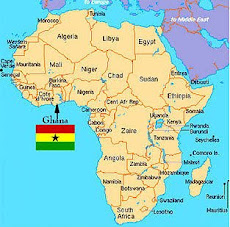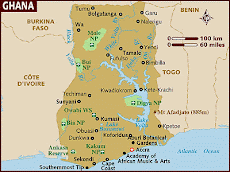On a week day, we head to either a school or the education office. The morning greetings are a Ghanaian way of life, so we go through the traditional greetings with everyone we pass on route, and with everyone we see at work.
One of our key roles in the education service is to carry out an “organisation assessment”. This week we have been preparing a presentation to senior officers on carrying out self-evaluation and identifying priorities for improvement. The outcomes of this process will then be used to support any applications for NGO support and to determine priorities for future spending. We have set up an organisational development committee to carry out this process. The pictures below show “Madame Director” and other education officers who are members of this committee.


In preparation for our committee, we splashed out on a 25 sheet flip chart which cost us 8.50 Ghana cedis (less than £4.00). The whole education office budget for a year’s running costs - pens, paper, fuel, copier and printer inks and everything else is 400 cedis i.e. one flip chart is about 2% of the annual budget. A 2GB memory stick, which we need in order to help people share data (no networked computers here yet) is 30 cedis. As for internet access and virus protection, these costs are totally prohibitive. We have to ensure our laptops and sticks are kept away from local computers, because of the prevalence of viruses. If anyone knows the head of Vodaphone, please put us in touch. Vodaphone has recently taken over Ghana Telecom, a Ghanaian mobile phone company and one of the biggest players in the local market. Some deal with schools and the education service would be of great benefit!
When we are spending most of the day in the education offices, we sometimes get lunch from the local street sellers. Street food is called “chop”. Our nearest chop sellers are shown below. One woman sells hard boiled eggs, yam chips and a local dish called “red red”, which happens to be Linda’s favourite local food. It consists of a spicy bean stew that is served with fried plantain. This is really filling, and for the equivalent of 30 pence, we both have a meal. The other chop seller produces a very tasty, savoury food, called koosei, which is made mainly of bean flour batter.
When we are spending most of the day in the education offices, we sometimes get lunch from the local street sellers. Street food is called “chop”. Our nearest chop sellers are shown below. One woman sells hard boiled eggs, yam chips and a local dish called “red red”, which happens to be Linda’s favourite local food. It consists of a spicy bean stew that is served with fried plantain. This is really filling, and for the equivalent of 30 pence, we both have a meal. The other chop seller produces a very tasty, savoury food, called koosei, which is made mainly of bean flour batter.
In our work we are having to learn new meanings of English words:
Sensitise – Familiarise people/inform people/raise awareness
Sacrifice – use your own time and money to fund work activities; many do.
Motivation – giving a bonus/money/gift to an individual to participate in an activity such as a meeting, or to carry out a specific task.
So: “Next week we are going to sensitise the Education Office Staff about assessing the state of their organisation and their development priorities. We have made a sacrifice in bringing our digital projector, producing a PowerPoint presentation and adding photographs. We may even buy some biscuits and water to motivate the team.”
The other aspect of our daily work is to meet with people at schools and devise a programme that will help improve teaching and learning, organisational management, and develop leadership skills. Much of this last week was spent in visiting schools, observing lessons, and meeting with teachers and headteachers. We are working with Wa School for the Blind, and they are keen for us to support the newly qualified kindergarten teachers. Of course, this stage is way out of our comfort zone. Add to this, the fact that all the children are blind and the teaching takes place in Dagaare, not English, and you can see that we have a real challenge on our hands. The picture below shows Haydn planning his work with the kindergarten, not playing (he says!)

In our work we tend to want to put things in our diary and set a time for the start and end of appointments etc. We are having to adjust to the Ghanaian way of working. Very few people have watches. We must say that Ghanaians, have a good sense of time based purely on the sun’s position. With no watches and no diaries we are having to learn flexibility as a vital skill. We have a feeling that we may become too flexible and have trouble adapting back to a western way of working on our return. With some schools, we have waited for them to get back to us, but are quickly learning to pay a visit and say, “we are coming in at this time on that day, OK”? It usually works, although headteachers carry a lot of information in their heads and can say, “that’s no good because we have an activity on that day”. At least we do get an appointment and are able to work with the schools and staff. We will feature some of our visits and school based activities in future blog entries.
At the end of a working day it is home to our house, preparat
 ion of a meal in our kitchen – chef Lin is featured is the picture. It is then to bed under the mosquito net, with the incongruity of all the electricity being off and local people standing outside their homes talking on mobile phones – it is cheaper late at night. We are clearly adapting to the 5.00 a.m. water collecting by being sound asleep soon after 9.00 p.m.
ion of a meal in our kitchen – chef Lin is featured is the picture. It is then to bed under the mosquito net, with the incongruity of all the electricity being off and local people standing outside their homes talking on mobile phones – it is cheaper late at night. We are clearly adapting to the 5.00 a.m. water collecting by being sound asleep soon after 9.00 p.m. Today is Saturday and we are having time at home to catch up with house and work things. It is market day in Wa, so there are several people and lorries passing our house, carrying produce to market. Just a few hour ago, the lorry below stopped outside our house, because the driver had to do some work on the engine. Lin got into conversation – main ly in broken Waali and sign language – with several of the women, who were really friendly. Some of them motioned that they wanted water, so Lin filled a bottle and threw it up to them. Next minute, they had collected together a load of tomatoes and passed them down to Lin. There was absolutely no expectation of payment. People are so incredibly kind and generous, even when they have so little.
ly in broken Waali and sign language – with several of the women, who were really friendly. Some of them motioned that they wanted water, so Lin filled a bottle and threw it up to them. Next minute, they had collected together a load of tomatoes and passed them down to Lin. There was absolutely no expectation of payment. People are so incredibly kind and generous, even when they have so little.
 ly in broken Waali and sign language – with several of the women, who were really friendly. Some of them motioned that they wanted water, so Lin filled a bottle and threw it up to them. Next minute, they had collected together a load of tomatoes and passed them down to Lin. There was absolutely no expectation of payment. People are so incredibly kind and generous, even when they have so little.
ly in broken Waali and sign language – with several of the women, who were really friendly. Some of them motioned that they wanted water, so Lin filled a bottle and threw it up to them. Next minute, they had collected together a load of tomatoes and passed them down to Lin. There was absolutely no expectation of payment. People are so incredibly kind and generous, even when they have so little.We do hope people in the UK enjoyed bonfire night. It is hard for us to imagine the cold weather and dark nights, while we are applying layers of sun screen and seeking shade at every possible opportunity. However, we are clearly aclimatising, as we haven't needed to sleep with our fan on for the last 2 weeks.




